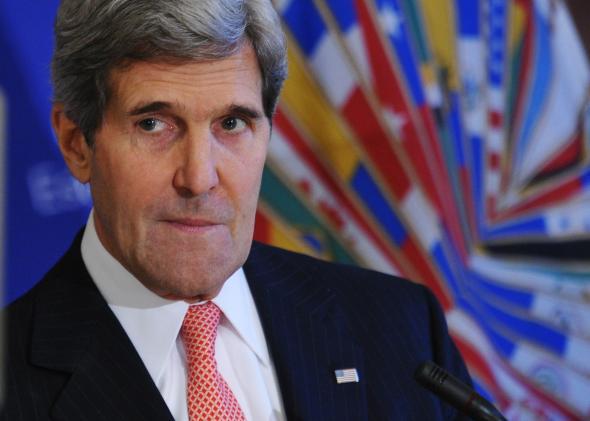After a 190-year run, Secretary of State John Kerry confirmed yesterday in a speech at the Organization of American States that the Monroe Doctrine is a thing of the past:
When people speak of the Western Hemisphere, they often talk about transformations that have taken place, but the truth is one of the biggest transformations has happened right here in the United States of America. In the early days of our republic, the United States made a choice about its relationship with Latin America. President James Monroe, who was also a former Secretary of State, declared that the United States would unilaterally, and as a matter of fact, act as the protector of the region. The doctrine that bears his name asserted our authority to step in and oppose the influence of European powers in Latin America. And throughout our nation’s history, successive presidents have reinforced that doctrine and made a similar choice.
Today, however, we have made a different choice. The era of the Monroe Doctrine is over. (Applause.) The relationship – that’s worth applauding. That’s not a bad thing. (Applause.) The relationship that we seek and that we have worked hard to foster is not about a United States declaration about how and when it will intervene in the affairs of other American states. It’s about all of our countries viewing one another as equals, sharing responsibilities, cooperating on security issues, and adhering not to doctrine, but to the decisions that we make as partners to advance the values and the interests that we share.
The remarks got a lot of attention in the Latin American press, though it seems like Kerry wasn’t really trying to make news and was in fact stating the obvious: The U.S. is much less influential in Latin American politics than it used to be and with the emergence of China and regional player Brazil, is no longer the only major power with significant economic and political interests in the region. And in fact, Latin America has been somewhat on the backburner of U.S. foreign policy since the end of the Cold War.
This is a good thing! Latin American affairs don’t get that much attention in the U.S. because by global standards, it’s relatively stable and increasingly prosperous—drug violence in Mexico, Venezuela’s erratic leadership, and Haiti’s humanitarian catastrophe notwithstanding. Given the track record of American interventions in the region, it not be the worst thing that U.S. attention is focused elsewhere.
Of course, certain recent revelations have made Kerry’s case a bit more difficult to make
